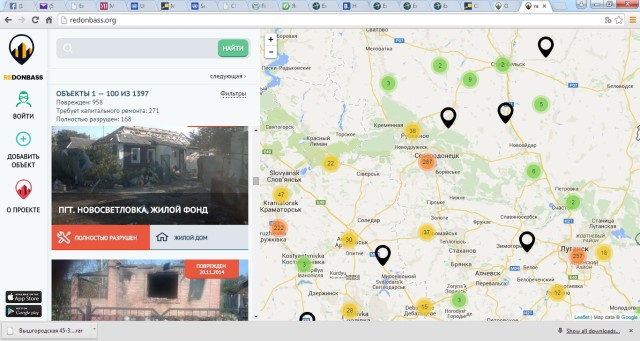
A man walks through a passageway of a mental hospital destroyed during heavy fighting between Ukrainian army and pro-Russian rebels in June in the village of Semyonovka, near the eastern Ukrainian city of Slaviansk, Sept. 28, 2014. (Reuters)
The crisis that plunged east Ukraine into war in November 2013 has damaged or destroyed critical infrastructure and limited access to areas caught up in fighting between Ukraine’s government forces and pro-Russian rebels. In order to assess damage, the United Nations Development Program (UNDP) turned to crowdsourcing to help restore social infrastructure as part of a United Nations, European Union and World Bank Recovery and Peacebuilding Assessment for Eastern Ukraine.
In an email interview with TECHtonics, UNDP’s Ukraine Deputy Resident Representative, Inita Pauloviča, discussed the platform the agency put together to address these issues as effectively and efficiently as possible.
Q. How did this idea come about?
Pauloviča: … Due to the ongoing conflict, the access to the territories was limited; and we came up with this crowdsourcing platform to engage volunteers, local officials and communities in helping restoration of critically important social infrastructure.
We also think that it is important for people who had to leave their homes to save their lives to monitor the situation and keep in touch with their communities.
Drive for innovation has long been the focus of the UNDP Ukraine’s development agenda. Through a number of hackathons, innovation labs, and Social Good Summit meet-ups, we bring together on a regular basis leading thinkers and practitioners, social innovation champions, students, academia, business representatives, innovators, and trend-setters to find solutions to the development challenges that Ukraine faces.
Over the years, UNDP has initiated and supported a number of innovative projects that resulted in practical tools and solutions that improve services and tackle problems effectively and efficiently. Several pilot projects tested new and out-of-the-box approaches to solving developmental problems in the areas of municipal solid waste management, e-governance, administrative services provision, anti-corruption, access to public information, and citizen engagement with policy-making.
Q. What does the app do exactly?
Pauloviča: Using an interactive map, ReDonbass, and a mobile app (Android and iOS), people of Donetsk and Lugansk regions can report damaged homes, hospitals, schools, kindergartens or libraries.

A screenshot of UNDP’s app and crowdsourcing map for east Ukraine damage assessment. (UNDP)
The easy-to-use interactive tool allows any person with a mobile phone and access to the Internet to download the most accurate data about the building in its location, photographs of the damage, and the status of the recovery phase. After that, the Ukrainian government and international donors will use the data to better plan reconstruction.
Information from the map will contribute to an ongoing Recovery and Peacebuilding Assessment for Eastern Ukraine. UNDP is part of the assessment that brings the United Nations, the European Union and the World Bank Group together to analyze the impact of the conflict and offer recommendations for short-term recovery and peacebuilding over the next two years.
We think that this easy-to-use interactive map is a natural solution to help the Government and international donors define priorities in early recovery.
Q. How long has it been deployed?
Pauloviča: The map [was] launched three weeks ago and information about 1400 damaged buildings [has] already been uploaded. We expect even more uploads as many NGOs, volunteer groups and local governments started to share information about it among local activists and communities.
The map has also proven to be very useful for the experts from the Ukrainian Government and a recently launched UNDP-Government of Japan project aiming to restore critical infrastructure for social care and services. They [are] using it to identify schools, orphanages, elderly homes, and social services centers that need to be restored and rebuilt first.
Q. Have you used this approach before in other countries?
Pauloviča: Similar technology has been employed by UNDP in a number of countries that lived through crises.
We’ve been inspired by the work of crisis mapper Patrick Meier as well as Ushahidi, a free, open-source software for collecting, visualizing and mapping information.
In … Macedonia, we designed an app to ensure public access to data on dangerous events like earthquakes, floods and fires and potential hazards like violent thunderstorms and heavy snowfalls.
In Georgia, UNDP supported ELVA, an NGO that pioneered a reporting system that uses text message and the internet to combine the mapping of Ushahidi with the requirements of human-rights researchers
And last year in Ukraine, we launched a mobile app for free on Google Play which provides easy access to municipal emergency services and allows citizens to report cases of corruption via 14 different anti-corruption hotlines.
Q. Based on results, might you use the same approach again in other areas of conflict?
Pauloviča: Indeed the approach can be used anywhere in any country in the world where people have relatively high access to mobile technologies (smartphones) and the Internet.
It is very simple, user-friendly, intuitive and free of charge. I think this is the technology of the future and we will see more and more of it in different parts of the planet. And one of UNDP’s priorities is to promote sharing of knowledge and high technologies that help people to live better lives.


